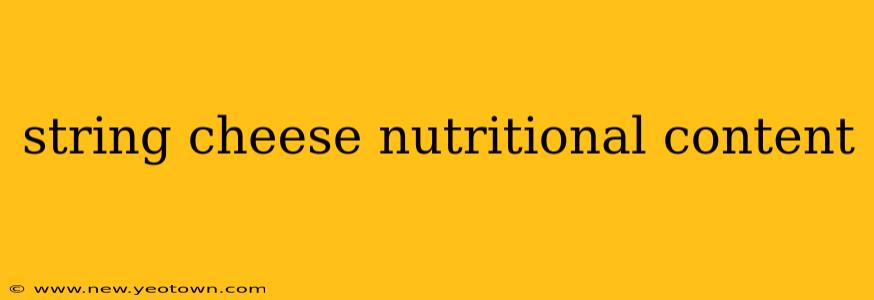String cheese. That delightful, squeezable snack that's been a lunchtime staple for generations. But beyond its convenient, fun format, what's the real nutritional story behind this dairy delight? Let's unravel the nutritional content of string cheese and discover why it deserves a spot in your diet.
My name is Sarah, and I'm a registered dietitian with a passion for making healthy eating accessible and enjoyable. I've spent years studying nutrition, and I'm excited to share my knowledge with you today. We'll explore everything from the macronutrient breakdown to the vitamins and minerals packed into those little cheesy strings.
What are the Macronutrients in String Cheese?
String cheese is primarily a source of protein and fat, with a smaller amount of carbohydrates. The exact macronutrient profile can vary depending on the brand and type of milk used (whole milk, low-fat, etc.). However, a typical serving (about 1 ounce, or one string) generally provides:
- Protein: Around 7 grams. Protein is essential for building and repairing tissues, making string cheese a great snack for active individuals or those looking to support muscle growth.
- Fat: Around 5-8 grams, depending on the fat content of the milk. This fat provides energy and is also a source of fat-soluble vitamins. Choose low-fat options for a lower calorie count.
- Carbohydrates: Relatively low, typically under 1 gram. This makes string cheese a good choice for those following low-carb diets.
How Much Calcium is in String Cheese?
Is string cheese a good source of calcium? Absolutely! String cheese is an excellent source of calcium, a crucial mineral for maintaining strong bones and teeth. One serving often provides around 10-15% of the recommended daily intake of calcium. This makes it a convenient and delicious way to boost your calcium intake, particularly important for growing children and adults seeking to prevent osteoporosis.
What Vitamins and Minerals Does String Cheese Contain?
Beyond calcium, string cheese contains other essential vitamins and minerals, albeit in smaller amounts. These include:
- Vitamin A: Important for vision and immune function.
- Vitamin D: Crucial for calcium absorption and bone health.
- Phosphorus: Plays a key role in bone health and energy production.
- Zinc: Supports immune function and wound healing.
The exact amounts of these vitamins and minerals will vary based on the brand and processing methods.
Is String Cheese Healthy?
Is string cheese healthy for weight loss? This depends on your overall diet and how much you consume. While string cheese offers protein and calcium, it is also relatively high in fat and calories compared to other snacks. Moderation is key. Choosing low-fat or part-skim varieties can help reduce the calorie and fat content without significantly sacrificing the nutritional benefits.
How Many Calories are in String Cheese?
The calorie count of string cheese varies based on the size of the serving and the fat content. A typical one-ounce serving of whole milk string cheese can contain around 70-80 calories, while low-fat varieties may have slightly fewer.
Is String Cheese Good for You?
The answer is a resounding yes – in moderation. String cheese offers a convenient and delicious way to incorporate protein, calcium, and other essential nutrients into your diet. Just be mindful of portion sizes and choose lower-fat options if you're watching your calorie intake. It's a versatile snack that can easily fit into a balanced diet.
I hope this detailed look at string cheese nutrition has been informative and helpful. Remember, a balanced diet is key, and string cheese can be a valuable component of a healthy eating plan. Consult with a healthcare professional or registered dietitian for personalized dietary advice.

